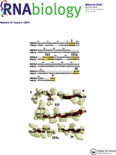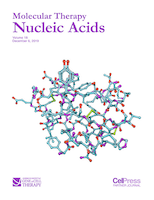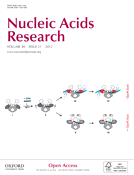
NUCLEOSIDES NUCLEOTIDES & NUCLEIC ACIDS
Scope & Guideline
Bridging Disciplines in Nucleoside and Nucleotide Research
Introduction
Aims and Scopes
- Genetic Polymorphisms and Disease Associations:
Research frequently explores the associations between genetic polymorphisms in nucleic acid-related genes and various diseases, including cancer, metabolic disorders, and infectious diseases. This area aims to elucidate how these genetic variations impact disease susceptibility and progression. - Nucleotide Metabolism and Therapeutics:
The journal publishes studies on the metabolism of nucleotides and their role in therapeutic contexts, particularly in cancer treatment and drug development. This includes investigations into nucleoside analogs and their mechanisms of action. - Molecular Biology Techniques and Innovations:
There is a strong emphasis on methodological advancements in molecular biology techniques, including the synthesis of nucleoside derivatives, oligonucleotide synthesis, and innovative analytical methods such as mass spectrometry and bioinformatics. - MicroRNAs and Long Non-Coding RNAs:
The exploration of microRNAs and long non-coding RNAs in gene regulation, cancer biology, and their potential as biomarkers or therapeutic targets is a key focus area. - Bioinformatics and Computational Biology:
The journal features research that employs bioinformatics tools and computational modeling to understand nucleic acid interactions, predict gene functions, and analyze large genomic datasets.
Trending and Emerging
- COVID-19 and Infectious Disease Research:
The impact of the COVID-19 pandemic has led to a surge in research related to genetic susceptibility, antiviral treatments, and the role of nucleotides in immune responses against infections. - Cancer Genomics and Precision Medicine:
There is an increasing emphasis on cancer genomics, particularly studies linking genetic variations and tumor biology to precision medicine approaches, which tailor treatments based on individual genetic profiles. - Functional Role of Non-Coding RNAs:
Research into the functional roles of non-coding RNAs, including microRNAs and long non-coding RNAs, is gaining prominence, with implications for cancer biology, gene regulation, and therapeutic applications. - Metabolomics and Nucleotide Profiling:
Emerging studies are focusing on metabolomic profiling of nucleotides and their metabolites in various biological contexts, providing insights into metabolic pathways and disease states. - Advanced Drug Delivery Systems:
Research on innovative drug delivery systems, particularly those utilizing nucleic acids for targeted therapy, is on the rise, reflecting the growing interest in nucleic acid-based therapeutics.
Declining or Waning
- Traditional Antiviral Agents:
Research focused on classical antiviral nucleoside analogs has decreased, possibly due to the rise of novel therapeutic approaches like RNA interference and CRISPR technology, which offer alternative strategies for viral infections. - Basic Nucleotide Biochemistry:
Studies that solely emphasize the biochemistry of nucleotides without clinical or therapeutic implications have waned. The journal's focus has increasingly shifted towards applications and translational research. - Plant-Based Nucleotide Sources:
Research into naturally occurring nucleosides and their extraction from plant sources has become less prominent, as synthetic and semi-synthetic approaches gain more attention for their efficiency and specificity.
Similar Journals

DNA AND CELL BIOLOGY
Illuminating the Path of Cellular AdvancementsDNA AND CELL BIOLOGY, published by Mary Ann Liebert, Inc, is a distinguished journal in the realms of cell biology, genetics, and molecular biology, holding a notable position in its Q3 and Q2 quartile rankings across multiple academic categories as of 2023. With an ISSN of 1044-5498 and an E-ISSN of 1557-7430, this journal has been a pivotal platform for the dissemination of cutting-edge research since its inception in 1990, extending its coverage through 2024. Situated in the United States, the journal offers high-quality peer-reviewed articles, exploring significant advancements in biological sciences while fostering interdisciplinary collaborations within the research community. Though it currently does not offer open access, subscribed institutions and individual readers benefit from its rich repository of knowledge. The journal's rigorous standards and impactful content make it an essential resource for researchers, professionals, and students alike, aiming to stay at the forefront of discoveries influencing DNA and cellular dynamics.

RNA Biology
Unraveling the Complexities of RNA ScienceRNA Biology is a premier journal published by Taylor & Francis Inc, focusing on the intricate and evolving field of RNA research. With an ISSN of 1547-6286 and E-ISSN of 1555-8584, this journal has established itself as an essential resource for professionals, researchers, and students engaged in both molecular and cell biology. Recognized in the 2023 quartile rankings, RNA Biology holds a distinguished Q1 category in Molecular Biology and a Q2 category in Cell Biology, indicative of its significant impact and reputation within the scientific community. The journal emphasizes the importance of RNA in various biological processes, highlighting both fundamental and applied aspects, which is crucial for advancing our understanding of gene expression and regulation. With a strong Scopus ranking, including Rank #105/410 in Molecular Biology and Rank #83/285 in Cell Biology, RNA Biology is not just a publication but a vital platform for sharing groundbreaking findings and insights into RNA research. With a convergence that spans from 2004 to 2024, the journal promises to continue its legacy of excellence in disseminating important discoveries in RNA science, contributing richly to ongoing scientific dialogue and innovation.

Biochemistry and Cell Biology
Fostering collaboration and knowledge in the heart of biochemistry and cell biology.Biochemistry and Cell Biology, published by Canadian Science Publishing, is a prestigious journal that has been instrumental in advancing the fields of biochemistry, molecular biology, and cell biology since its inception in 1986. With an impressive scope spanning innovative research findings to comprehensive reviews, this journal serves as a vital resource for researchers, professionals, and students alike. Currently positioned in the Q2 quartile in Biochemistry and Q3 quartiles in both Cell Biology and Molecular Biology, it reflects a robust contribution to scientific discourse, placing it among reputable publications in its field. The journal boasts notable rankings within the Scopus database, highlighting its impact and relevance, and continues to be a valuable platform for disseminating pivotal research. By providing access to a wide array of articles, the journal remains committed to fostering knowledge and collaboration in the scientific community.

Molecular Therapy Nucleic Acids
Advancing nucleic acid innovations for a healthier tomorrow.Molecular Therapy Nucleic Acids is a premier open-access journal published by CELL PRESS, dedicated to advancing the field of molecular medicine through the innovative application of nucleic acid-based therapies. Since its inception in 2012, this journal has become an essential resource for researchers and professionals in drug discovery and molecular medicine, reflected in its status as a Q1 journal in both categories for 2023. With a notable impact factor and high rankings in Scopus, including #8 out of 157 in Drug Discovery and #16 out of 178 in Molecular Medicine, it serves to disseminate groundbreaking research and foster collaborations among scientists worldwide. The journal's comprehensive scope encompasses a wide variety of topics, including gene therapy, RNA interference, and CRISPR technology, ensuring that it remains at the forefront of scientific excellence. With open access availability, Molecular Therapy Nucleic Acids actively promotes the widespread dissemination of knowledge, making its crucial insights accessible to students, researchers, and industry professionals alike.

Biomolecules
Where groundbreaking research meets open access knowledge.Biomolecules is a prestigious, peer-reviewed journal published by MDPI that has been dedicated to advancing the field of biochemical research since its launch in 2011. With an impressive impact factor positioning it in Q1 for Biochemistry and Q2 for Molecular Biology as of 2023, this journal serves as a vital platform for disseminating high-quality research findings related to biological macromolecules, including proteins, nucleic acids, and carbohydrates. Operating as an Open Access journal, it ensures that vital research is accessible to all, furthering knowledge dissemination and collaboration within the scientific community. Located in Basel, Switzerland, the journal has established a significant presence in major academic databases, holding commendable Scopus rankings in both Biochemistry and Molecular Biology. Researchers, professionals, and students will find Biomolecules an invaluable resource for cutting-edge research, reviews, and insights in the rapidly evolving domains of biochemistry and molecular biology.

FUNCTIONAL & INTEGRATIVE GENOMICS
Pioneering Discoveries in Genetics and Molecular BiologyFUNCTIONAL & INTEGRATIVE GENOMICS, published by Springer Heidelberg, is a leading journal in the fields of genetics and molecular biology. Established in 2000, it serves as a pivotal platform for advancing our understanding of genomic functionality and integration, making significant contributions to both basic and applied research in genetics. With a robust impact factor and a ranking in the Q3 quartile for Genetics and Q2 for Medicine (Miscellaneous), the journal aims to publish innovative research that explores the relationships between genomic data and biological functions, appealing to a diverse audience of researchers and professionals. Although it operates under a subscription model, the journal's extensive archives remain a valuable resource for academics seeking to stay abreast of the latest findings and methodologies in genomics. As the field evolves, FUNCTIONAL & INTEGRATIVE GENOMICS remains committed to fostering scholarly dialogue and the dissemination of groundbreaking studies that influence future research trajectories.

NUCLEIC ACIDS RESEARCH
Unlocking the Secrets of DNA and RNANUCLEIC ACIDS RESEARCH, published by Oxford University Press, is a premier peer-reviewed journal in the field of genetics, holding a prestigious Q1 ranking in this domain as of 2023. Since its inception in 1974 and with a converged publication horizon extending to 2024, this journal has established itself as a vital resource for researchers and professionals interested in the molecular aspects of nucleic acids, encompassing DNA and RNA studies as well as their implications in biochemistry and molecular biology. With an impressive Scopus rank of #6 out of 347 in Genetics, this journal is positioned in the 98th percentile among its peers, highlighting its significant impact and relevance in the scientific community. As an open access journal since 2005, NUCLEIC ACIDS RESEARCH ensures wide dissemination of knowledge, promoting collaborative advancements in genetic research. For those looking to stay at the forefront of nucleic acid research, this journal remains an essential publication for accessing cutting-edge findings and innovative methodologies in the field.

Non-coding RNA Research
Fostering Global Collaboration in RNA ResearchNon-coding RNA Research, published by KEAI PUBLISHING LTD, is a leading open-access journal dedicated to advancing the field of non-coding RNA, a critical component in the landscape of molecular biology and genetics. Established in 2016, this journal aims to provide a platform for the dissemination of high-quality research focusing on the roles, mechanisms, and therapeutic potentials of non-coding RNAs in various biological processes and diseases. With impressive Scopus rankings placing it in the top quartile for both Biochemistry and Medical Biochemistry, as well as notable standings in Genetics and Molecular Biology, Non-coding RNA Research continues to attract contributions from globally recognized experts. The journal's commitment to open access ensures broad visibility and engagement with cutting-edge discoveries, thereby fostering an inclusive scientific dialogue that enhances understanding and innovation in this rapidly evolving field. For researchers and scholars, the opportunity to publish in a Q1 ranked journal not only validates their work but also enhances its impact, making Non-coding RNA Research an indispensable resource for anyone interested in the intricate workings of non-coding RNA.

CELLULAR SIGNALLING
Unlocking the Secrets of Signal TransductionCELLULAR SIGNALLING, published by Elsevier Science Inc, is a premier journal within the realm of Cell Biology, boasting an impressive Q2 category ranking as of 2023. With an ISSN of 0898-6568 and an E-ISSN of 1873-3913, the journal has established itself as a critical platform for advancing the understanding of cellular mechanisms and signal transduction pathways since its inception in 1989. Covering a vast array of topics in Biochemistry, Genetics, and Molecular Biology, it ranks notably at 87 out of 285 in the Scopus list, placing it in the 69th percentile among its peers. The journal serves as an invaluable resource for researchers, professionals, and students seeking high-quality, impactful studies that drive forward the field of cellular biology. While it operates under traditional subscription access, its highlights include rigorous peer-reviewed articles, reviews, and insights that continue to shape current scientific discourse.

ACTA BIOCHIMICA POLONICA
Pioneering Research for Tomorrow's Scientific BreakthroughsACTA BIOCHIMICA POLONICA (ISSN: 0001-527X, E-ISSN: 1734-154X) is a distinguished journal published by the ACTA BIOCHIMICA POLONICA in Poland, with a rich history dating back to 1955. As a prominent platform for disseminating research, it currently holds a Category Quartile of Q3 in the fields of Biochemistry, Genetics, and Molecular Biology, reflecting its commitment to advancing knowledge in these critical areas. This journal is indexed in Scopus, ranking 124 out of 221, placing it in the 44th percentile among general biochemistry, genetics, and molecular biology journals. Although it does not operate under an open-access model, ACTA BIOCHIMICA POLONICA remains a vital resource for researchers, professionals, and students seeking to delve into the latest developments and discoveries in biochemistry and molecular biology. Its strategic focus on contemporary topics ensures that it plays an essential role in shaping future scientific inquiries and fostering collaboration across various disciplines.